What Does Woodworking Mean?
So vast a topic, does the term ‘woodworking‘ state much of anything definitive when you say the word? Talk to woodland workers weaving hazel stems and weavers into a panel of fencing and you have one kind of worker of wood but in the raw as it were. Another bends a springy sapling attached to the root and via a rope wrapped around a spindle lodged between two fixed points a chair bodger emerges on the mental scene.
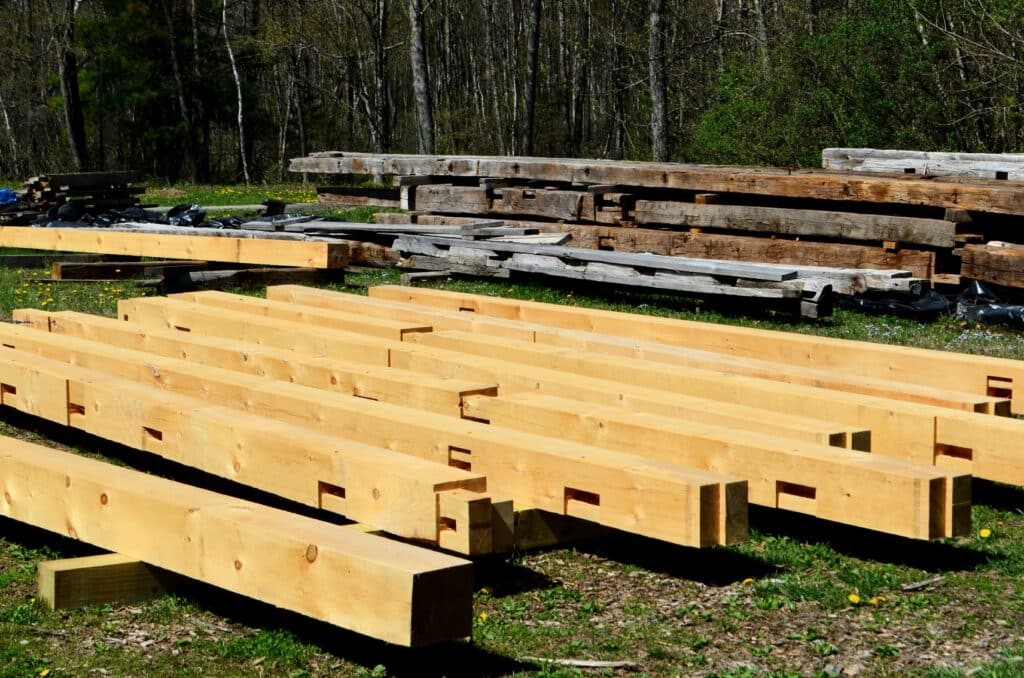
From coopers to carriage builders, wagon wheels to timber frames for massive buildings, furniture too, all can come under the common and generic term woodworker. When people introduce me to their friends they say, “Paul’s a carpenter.” or, “Paul’s a woodworker.” Their friends, immediately seeking common ground, make comments like, “Oh, my uncle turns wooden pens on a lathe.” or, “My friend went on a green woodworking course and now she makes wooden spoons from firewood and sells them on the street and at craft shows.”
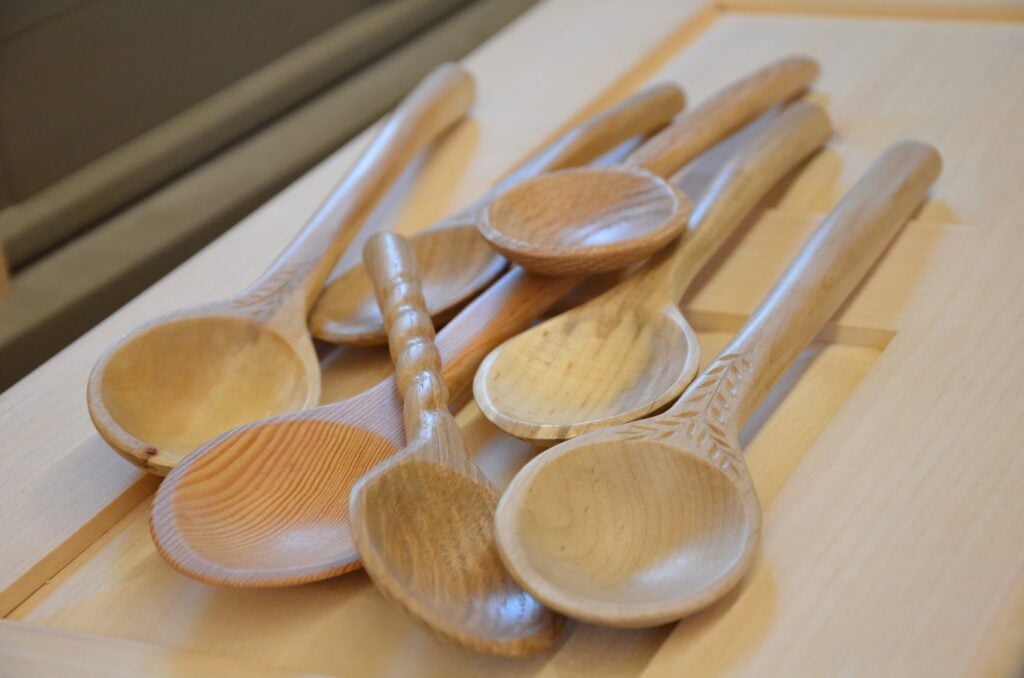
Truth is carpenter and woodworker are really generic terms. Woodworkers hardly pegs it these days. In times past and with 40 different woodworking trades all were related to by their title; wheelwright, cooper, carriage maker, cabinet maker, carpenter, joiner and so on. We’ve lost 90% of these woodworking trades Ask a roof carpenter if he makes chair spindles, wooden spoons or turns wooden pens and he might be offended or he might be completely unperturbed. On the one hand it takes a short time to learn to turn wooden pens surrounding a brass barrel insert and assemble the pen parts into a writing pen but it might take months or years to learn the building elements of carpentry construction sufficient to be competent on a building site.
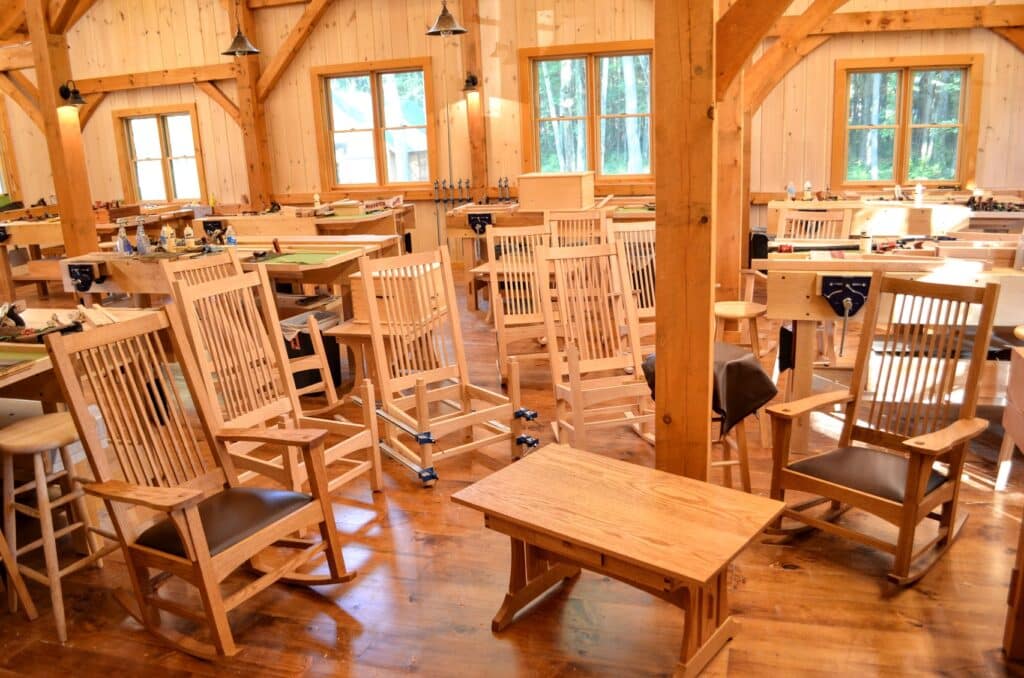
In the USA of course carpentry means to be able to build a whole house from foundation to roof because indeed the majority of the construction is made from wood. It’s more expansive than in the UK where most carpentry is trusses and prehungs. Just as turning pens on a lathe is a very small part of woodturning as a whole craft, so too is the whole craft of woodturning to furniture making. In the above you have four woodworkers using completely different tools, machines, techniques, equipment and methods. The only thing they really have in common, the hub to everything, is of course the wood itself. Beyond that there is nothing that connects them and yet they could all be called, simply, unpretentiously, woodworkers. So woodworker can mean a wide variety of things to different people.
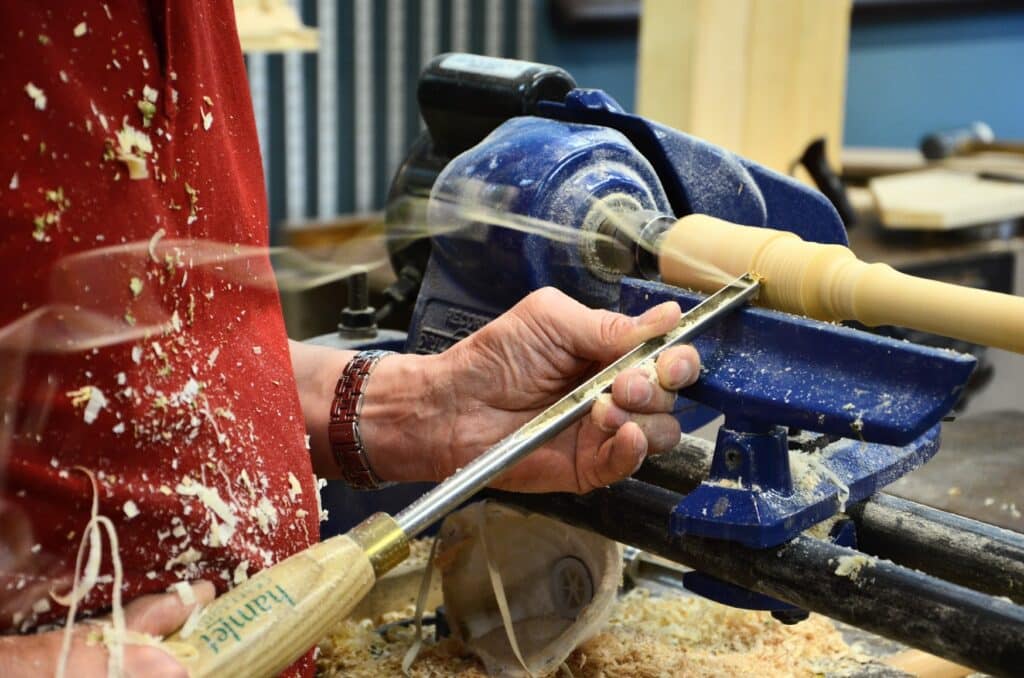
To my neighbours, many of whom are scientists, it means some kind of manual labourer if you actually do it to earn your living from. To a hobbyist woodworker who’s a technician or engineer in their daily work life it’s more a cleverly skilful thing they derive great interest from. I don’t know too many skilled crafting artisans who earn or have earned their living solely from skilled woodworking. And not many if any who earn part of their living from their woodworking either. I know some who have achieved admiring status for making even the simplest of things like turned pens and wooden spoons but it is not so much what they make that they are admired for but that they can actually make something of saleable quality and sell what they make from wood to actually sell for, well, interestingly, money itself! I often wonder if the marvellousness is that as consumers, buying everything we consume to live we can actually make something that sells or could be sold. Our culture today is that we know so few who can actually make much of anything at all let alone make a living selling what they make with their hands.
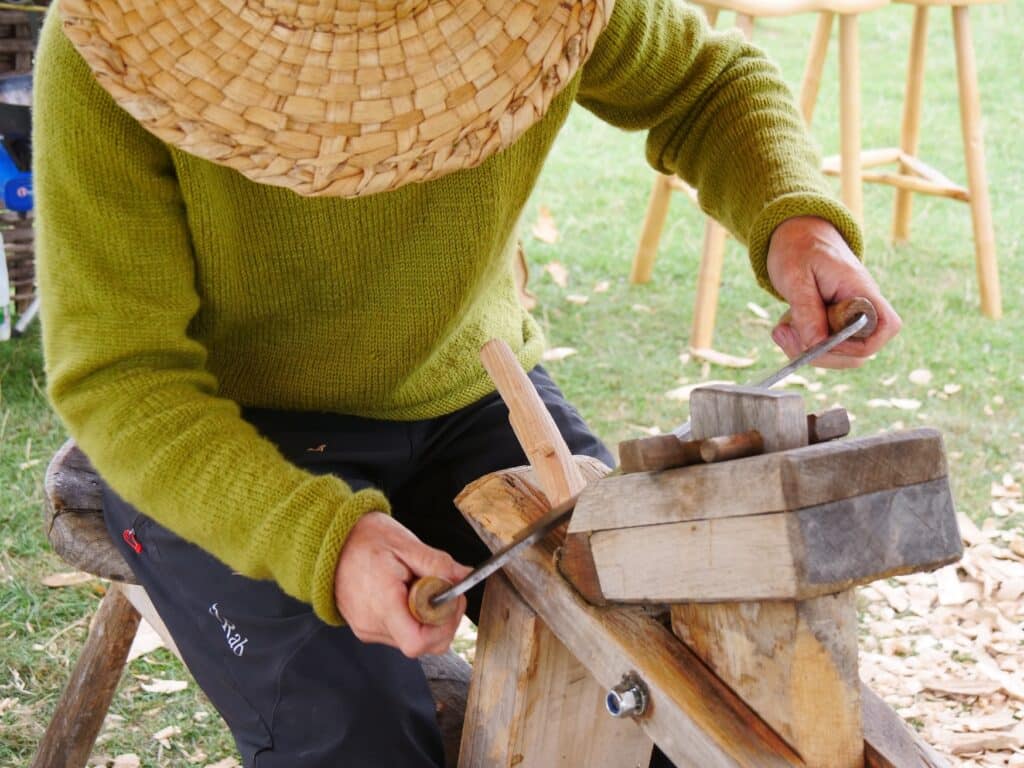
One of the things I actually enjoyed seeing in the USA was woodworkers selling their weekend’s work at craft shows. Though they wanted their pitch money back, maybe their hotel expenses and travel too, they were actually content to just sell what they made without actually turning a profit as such. Craft shows were fun and a good place to go if you had young children too.

Of course there are many times more amateur woodworkers than there are professionals, and specialisation has led to the demise of the all-rounders of the past. I was raised with woodworkers who could turn their hand to anything wood and, indeed, I write about my formative years with such men. In actuality I never worked with a carpenter until I worked in the USA. Mostly this was because the same or similar trade in the UK would be Joiner. Now joiner can be divided off and I might be more accurate calling all who work on construction sites here in the UK carpenters because their work more matches carpentry work than joinery work. Joiners create a wide range of products and in my day the cross between joiner and cabinet maker would be synonymous with pieces relying on true joints. In the USA on the other hand a cabinet shop and a cabinet maker generally refers to someone who makes plywood boxes for kitchens and bathrooms rather than anything to do with making fine furniture.
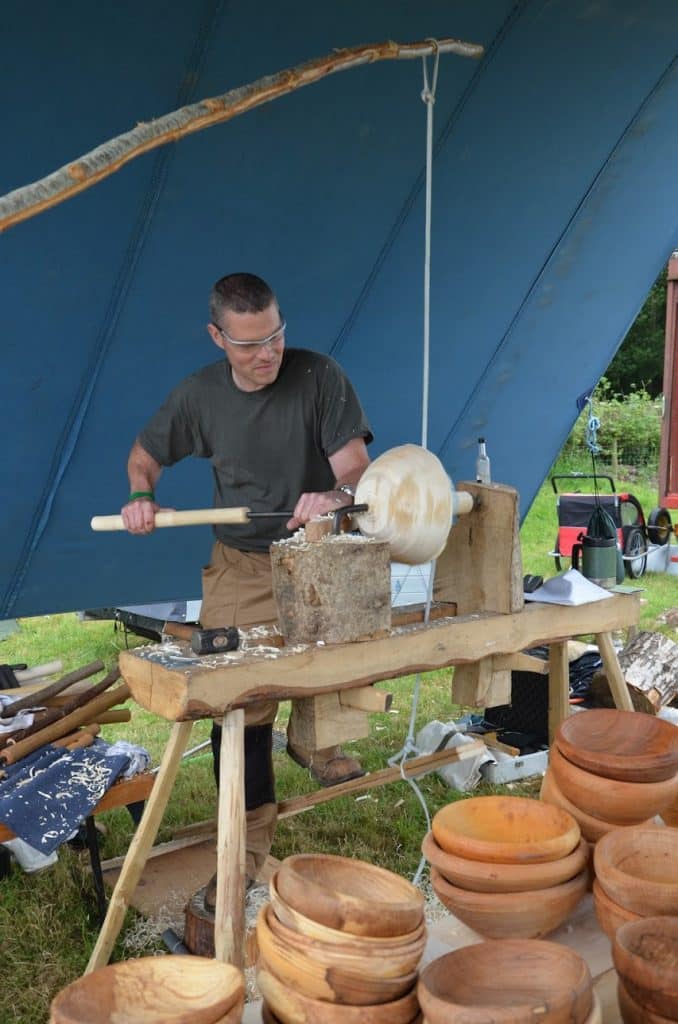
To some it seems the thing is to turn your interest into a business and a business is not so much a cohesive lifestyle that includes working wood but something that converts effort in hard cash. I have always questioned whether for me it was ever enough just to make money from in a good quantity or whether it is indeed something I can live as an alternative lifestyle as a way of living wholly. In a world where sportsmen, economists, artists, engineers and especially business men and women make the news with prefaces like millionaire or billionaire this or that, it seems ever more prevalent to measure successes by how much wealth you amass over a given period of living. Wealth seems to be some kind of qualifier. You know, “Billionaire Richard Branson…”. If you can make money, lots of it, your success becomes somehow quantifiable in the kind tangible terms some might relate to even though they have never known wealth themselves. It becomes measurable in something the whole world seems ever more able to relate to. In my world it has always been about following my desire for skilled work. I don’t really think the word ‘passion‘ describes the way I feel at all about my work because it’s not enough. It seems too much a haphazard effort to make something happen no matter what gets in the way and, really, something that happens to the exclusion of all else when in reality my work and my working is all about maximising the inclusion of all other things as much as is practicable from the world I live in.
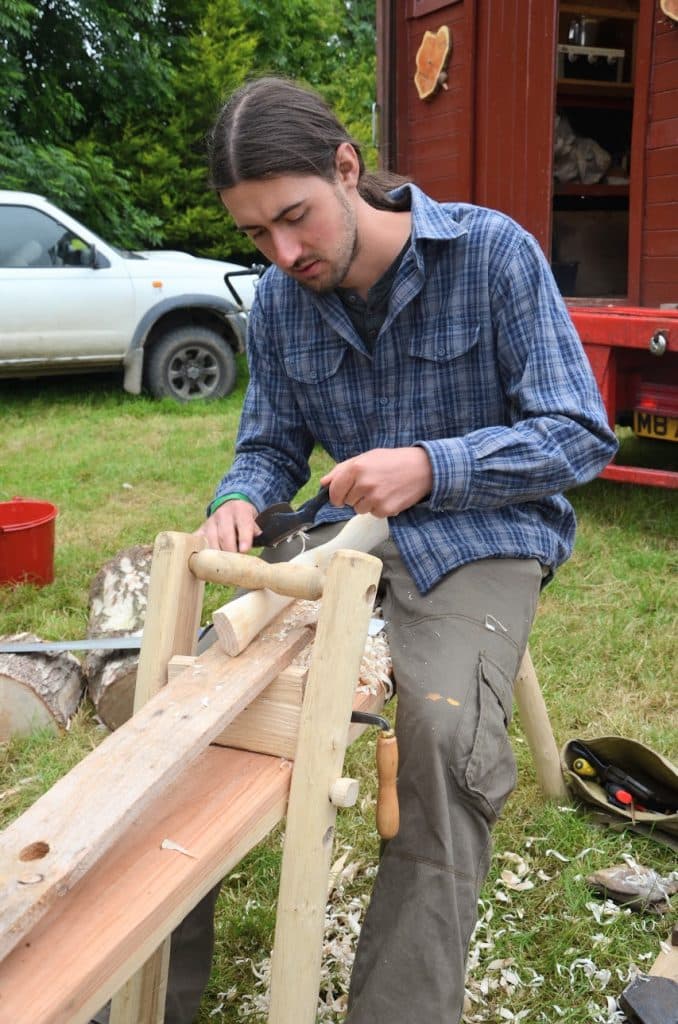
Yet the way I have seen and experienced it is that the original intent on the part of the ‘woodworker‘ is mostly to step away from a mundane tedium into a realm where they might establish a degree of controlled creativity over their life. A place that they could even step off a conveyor-belt existence into a world where they can indeed make wood work for them and in the process be immersed in a lifestyle relationship that is not unlike marriage; that what you started out doing was done because you discovered an alternative way of working that enabled you to live more freely and interestingly doing something you felt not merely passionate about but, well, joyfully engaged in. When I chose woodworking as a choice towards becoming a working artisan and a craftsman, I actually married my craft. In essence it was for me an irrevocable vow. A covenant!
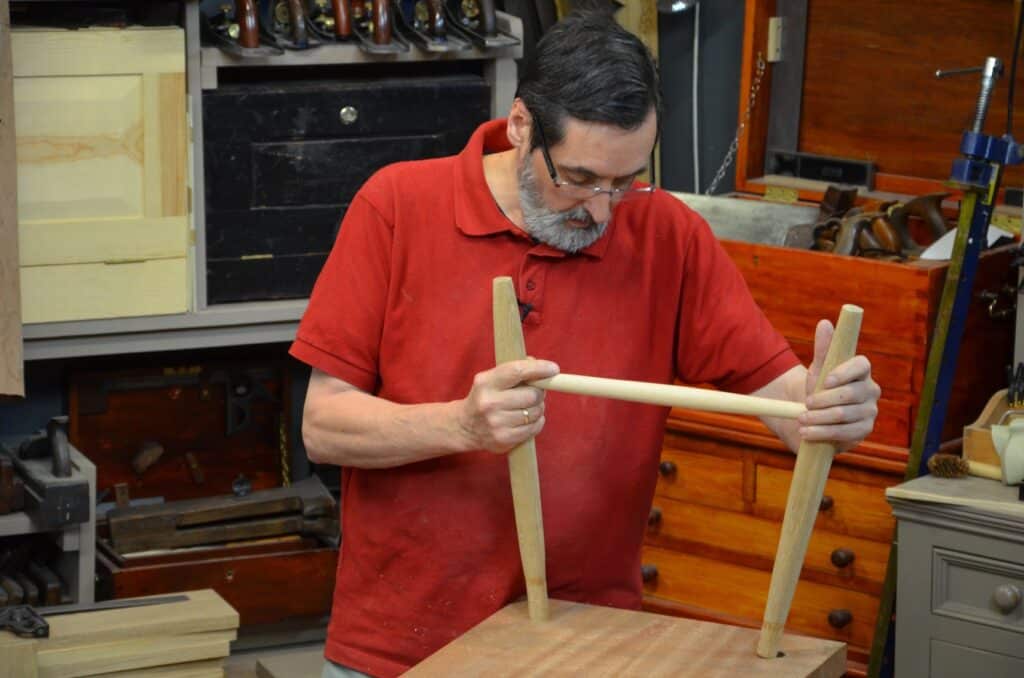
Woodworking is not frenetic or frenzied work so much as a pure intent to become something you started out not being. Woodworking to skilled people began as a passage of engagement; a knowing that a self disciplined development of skill would need to take place over a period of years. Without that intent it is unlikely to reach the high standard you hope to aspire to. Woodworking is a vision of future that may not yet exist for you but it is something you aspire to be. Often it begins with a spark of interest in something seen.
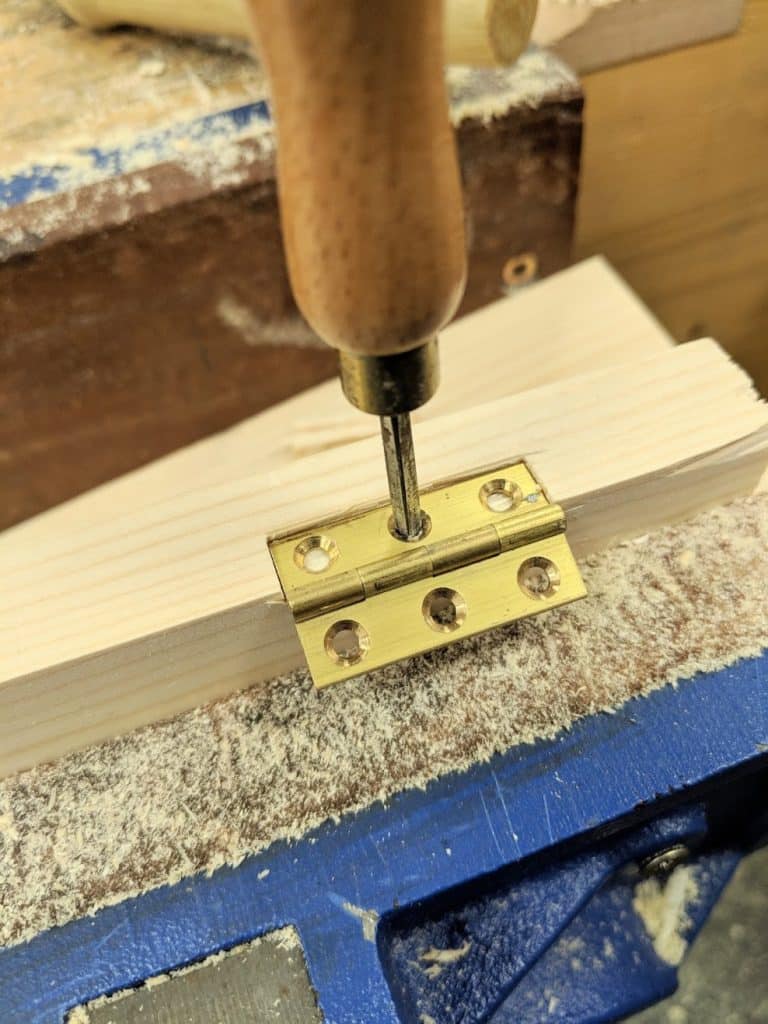
In my day it was first seeing a sharp chisel slice out a recess to receive a hinge flap in a few seconds. It was so skilfully executed I could scarcely breath as George did something I had never seen before. He did it with such dextrous speed I could scarcely record it in my mind. The brass hinge slid in place and held there by its perfect friction fit alone. It was at this critical point that I realised how very little I knew.
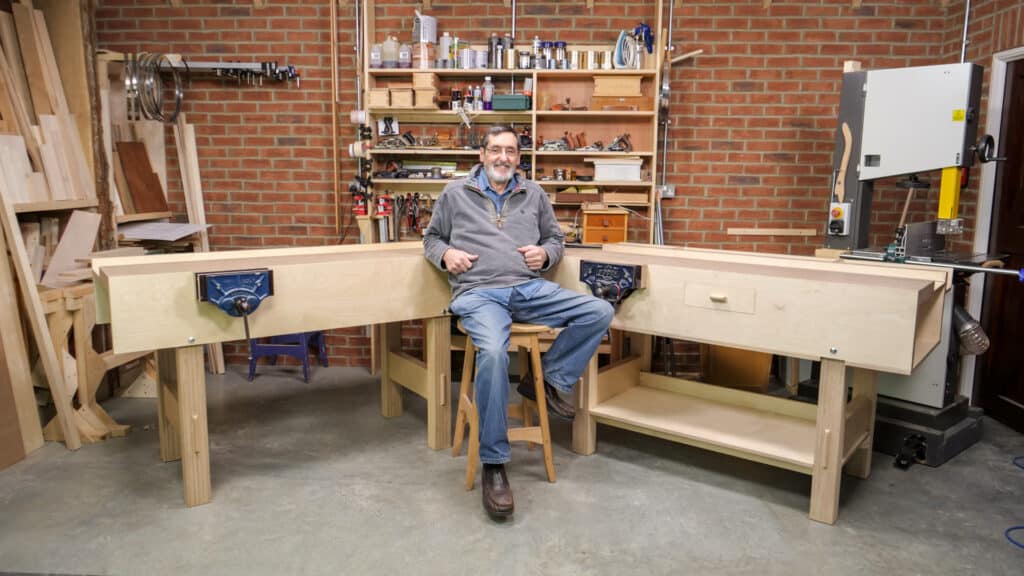
As a vocational craftsman, I love not only my own craft but the crafts of others. My work in recent years has shifted markedly. Thankfully it still revolves around my making but what I make in the workshop has really almost become more the byproduct. When I teach I make. It has always been that way. Whatever the students were making I made it alongside them. What I made served as the teaching vehicle for them to follow me with and this was indeed inspiring to them as an example of both the product, the technique, the method and the work ethic too. When I make I craft. The output is crafting craftsmanship in men, women and young people. It is a highly creative work and it is always high-demand. I am past retirement age by almost five years now. I no longer need to earn my living in the same way I did with a young family, mortgage and other payments. Why do I not stop? Well, I can’t. I have too much to do. I have so much I want to yet accomplish in my restructuring the way people view becoming skilled in woodworking. My work is crafting a new way of apprenticing in woodworking. It is unlikely that we will need cooperage for making wooden barrels or clog making because shoes are needed for workers going to work. What we do need is to recraft woodworking attitudes. To rethink why we want to work wood with our hands. It’s as much about dismantling the conveyor belts of mass manufacturing in our minds as it is in the reality of how we work at what we do. So many crafts are valid not because of what we make but that the craft somehow frees us to think and work three dimensionally doing what we feel the most about. From pens to clogs to timber-framed homes, it’s all woodworking and it’s what sets us free that matters the most. In doing all of this we regain our saneness. Let’s call it finding our vocational calling no matter our age!


I’ve been so discouraged lately, Paul. I’ve gotten to the point where I am crafting some really nice things and I’ve been trying to sell them at very reasonable prices to the end that I simply recoup the cost of materials so that I can make more. It just seems that no one wants to purchase anything that costs more than Wal-mart or Ikea and it is disheartening. The way finances are in my home, my craft has to support itself to be viable.
Mr.Kitchen,
I have the same problem were I live. The only place i can make any money is about 3 hours drive from my house. Look at craft fairs and places with a lot of tourist . be aware craft fairs can cost a lot to set up here in Georgia USA it can be anywhere for $150 to $500 for a 3 day weekend space in US dollars.
I am sorry to hear that Wills but don’t give up. My successes at craft shows was not copying others and designing things that were unique and dare I say cute in the shrewd sense of the word and not cutesy. It was nothing to bring home 5,000-8,000 in the sales of smaller stuff between $5 and $150 but I took furniture too but not really expecting to sell the pieces more to showcase what I could make. This gave me credibility and customers confidence that I know my stuff. Often too people may not expect to buy at shows but they take cards and order later. I have sold many a desk and expensive chair or bed or rocking chair way after the shows.
A desk would be an excellent Masterclass project!
Just out of curiosity, what kind of product do you make and about where do you try to sell it?
I think these two questions that you should ask yourself. If you are making say, shaker furniture and you try to market in a yuppie area. It might not sell well. If you make federal style furniture and try to sell it to a low income area, you might get the same result.
I have always liked to use Woodwright to describe what i do. Roy Underhill is where i first heard the name, I look it up and the definition is (woodwright is a person who works with wood) I thank that describes Paul and others who not only build cabinets and furniture but also turn, carve, make bowls ,build houses but have a passion and desire to create.
I’m an Chemical Industry Engineer. My professional activity takes place in a petroleum refinery, but I like woodworking since I was a boy. It was a woodworking workshop near my school, and I always went there after classes to watch the woodworkers at work. Due to personal reasons woodworking has been away from my life during a lot of years, but I never stopped liking it. I always felt the desire of learn woodworking, specially with hand tools, since the little I knew was with electric tools. Then I found Paul’s work in 2016, looking for a video in YouTube about wooden plan restoration, and I’ve resume woodworking since then.
I’m 50 years old now, and I probably will not be a good woodworker, since the time I can dedicate to woodworking is only part of my free time, but I’ve learned a lot, and I’m decided to learn more. It can sound rather silly, but I cannot explain how happy I felt the first time I was able to square a piece of rough-sawn wood only using a plane, a pair of winding sticks and a marking gauge, or how satisfying is restore a good old saw or plane, or sharpen a tool for cutting as I expect.
My next stage will begin becoming a premium member of WWMC. I haven’t done it yet since I’m in moving process and almost all my things will be in boxes in the next weeks or months, but I will have a workshop in my new house, and I’m impatient for beginning with some woodworking projects for it.
Paul, I wonder if you can imagine how important is being your work and your generosity for me. You are the woodworker, the artisan I would have liked to be. I will never be able to say how thankful I am.
Thank you for your kind words. You and everyone else who supports my efforts to make change for people who want to become good woodworkers. You mention being 50 years old. 19 years ago I was just 50 too. I feel I learned more in these last 20 years than the previous 20. I learned the value of belonging. I learned the value of allowing change, venturing out, embracing new realms, opening myself up to shifting perspectives and much more. You may not currently feel that you will become a ‘good‘ woodworker but I am not so sure we any of us know what it is to be a good woodworker. Surely it is to do with pursuing our calling no matter our age or ability at the time. If we had already arrived at our destination, then what would be the point in the journey. The journey for us is becoming what we are not.
Your comment struck a chord in me and I felt the need to reply as I am close to 50 myself (imagine that… as I don’t feel much older than I did a decade ago) and have started to look into using handtools more for small projects around the house.
You say that you “will not be a good woodworker” but I have to question that and ask what you mean with a “good” woodworker?
Will you be as experienced and skilled as Mr Sellers in the near future? Of course not, as you haven’t been working with wood almost daily for 50 years or apprenticed with a skilled joiner/cabinetmaker.
Will you be a more skilled woodworker than you were ten years ago in the future? Probably, if you set up your workshop and keep making things.
Are you more skilled than say 99% of the people in your vicinity? Probably as many have never held a plane in their hands and you have actually squared a piece of rough lumber using only hand tools.
I strongly believe that you should not think of it as a competition or a race. You are building skill (and confidence) step by step, enjoying the journey and satisfaction of your accomplishments. Even the “failures” will build experience (and character) as you will learn from them as well.
Building your own cabinets and/or furniture will, most likely, not be cheaper than getting them in a store but they will mean more to you and you will likely be able to make them to your own needs to a larger extent than if you buy them off the shelf.
Keep up doing what you like and cherish the time you get to do what you like even if it’s limited.
I’m closing in on 50 and I just picked woodworking back up, but I’m going at it more seriously this time since we have such high quality online teachers. I’m still kicking myself for not doing this earlier, as I’ve been a fan of Roy Underhill’s tv show for decades.
I expect to be enrolling in Paul’s online classes within the year so I can raise my competency for when I take up woodworking, gardening and forest management/coppicing(all done through Permaculture) as my retirement “job”.
You’re never too old.
Paul,
Another thought provoking blog post, thank you for sharing. Although a health professional, now for the 27th year, I do consider myself a woodworker as well. I designed and was the general contractor for my home. A project that I still work on as a finish carpenter. I am doing “ framing carpentry” in my basement building a workshop area to further develop my woodworking skills by following along with you. The further refinement of my skills seems a logical step to making my own spoons, cutting boards, furniture, even tools. It is an enjoyable creative process to make the items needed in my family’s daily life. To sell some would be nice, but to not have to buy these things in lieu of making them myself seems more rewarding.
Certainly your work now as a teacher is extremely valuable to me to help refine skills and teach new ones. I am certainly glad you chose not to retire!
Right to the point, especially the last paragraph.